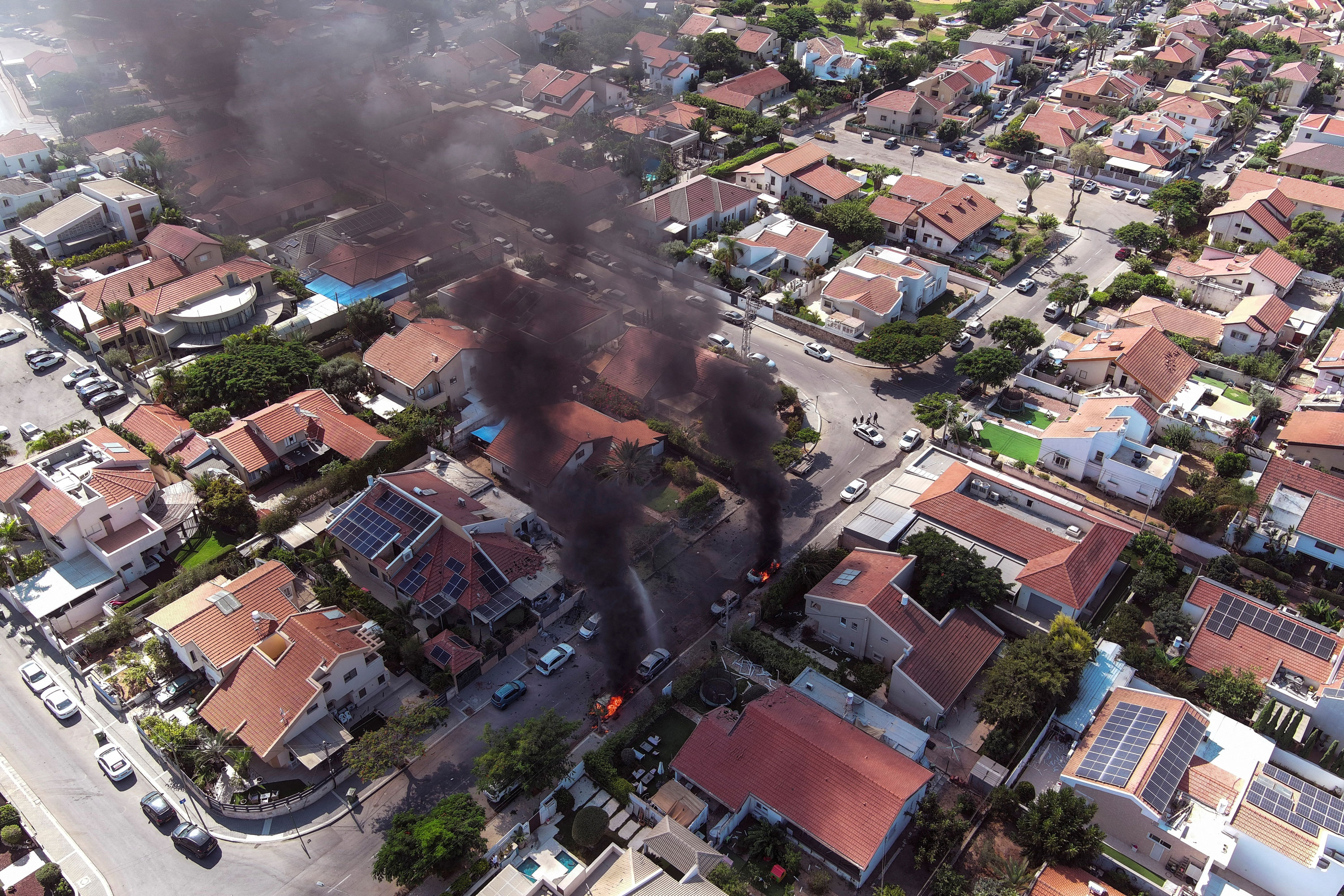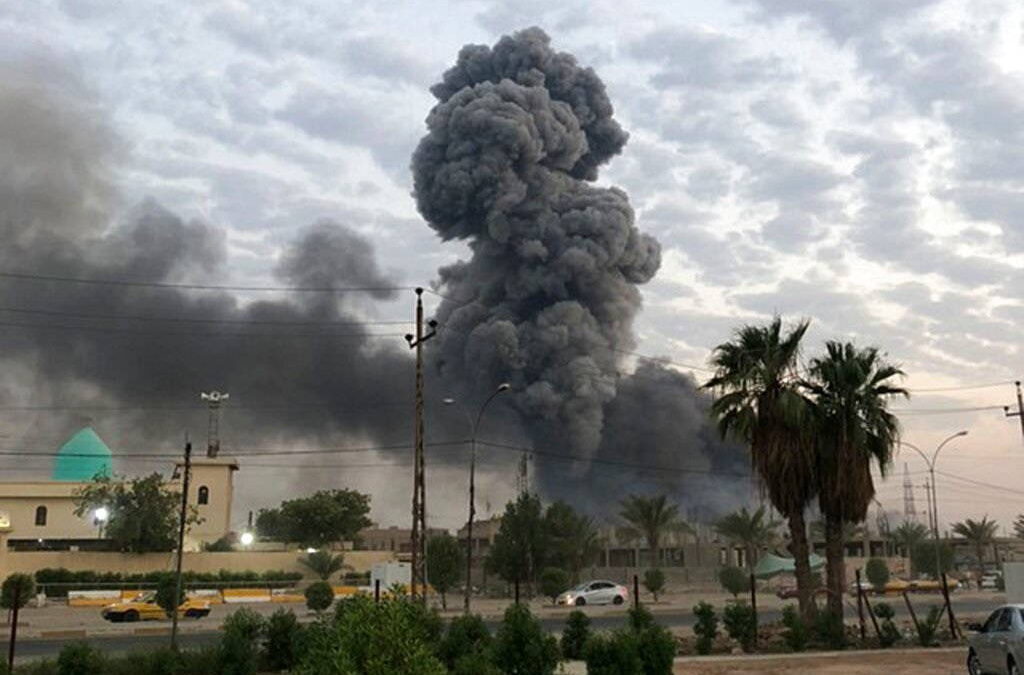Historical Context and Background

The relationship between Iran and Israel has been marked by deep-seated tensions and conflict for decades. The two nations are locked in a complex and multifaceted rivalry, driven by historical grievances, ideological differences, and strategic competition. This rivalry has manifested in a series of proxy wars, military confrontations, and diplomatic standoffs, shaping the political landscape of the Middle East.
Key Events and Motivations, Iran attack israel israeli
The historical tensions between Iran and Israel can be traced back to the establishment of the state of Israel in 1948. Iran, under the rule of the Shah, initially recognized Israel, but relations soured after the 1979 Islamic Revolution. The rise of the Islamic Republic in Iran led to a significant shift in Iranian foreign policy, with a focus on supporting Palestinian resistance against Israel and promoting the concept of an “Islamic Resistance Front” in the region.
The motivations behind the conflict are complex and intertwined. Iran’s leadership views Israel as a major threat to its security and regional interests, particularly in light of Israel’s nuclear capabilities and its perceived role in supporting opposition groups within Iran. Israel, in turn, sees Iran as a major sponsor of terrorism and a destabilizing force in the region, citing Iran’s support for Hezbollah in Lebanon, Hamas in Gaza, and other militant groups.
Role of Regional Powers and International Actors
The relationship between Iran and Israel is not isolated, but rather deeply intertwined with the dynamics of regional powers and international actors. The United States, as a key ally of Israel, has been a major player in the conflict, providing significant military and financial support to Israel and imposing sanctions on Iran. Other regional powers, such as Saudi Arabia and the United Arab Emirates, have also played a role in shaping the relationship between Iran and Israel, often aligning with the US stance on Iran’s nuclear program and its regional activities.
Timeline of Significant Attacks or Incidents
The conflict between Iran and Israel has been characterized by a series of significant attacks and incidents, highlighting the evolving nature of the rivalry.
The following timeline provides a brief overview of some key events:
- 1980s: Iran supports Hezbollah in Lebanon, which engages in attacks against Israel.
- 1990s: Israel carries out airstrikes against Iranian targets in Lebanon and Syria, targeting Iranian-backed groups.
- 2000s: The development of Iran’s nuclear program intensifies tensions with Israel. Israel conducts covert operations targeting Iranian nuclear facilities.
- 2010s: Israel launches airstrikes against Iranian targets in Syria, aiming to prevent Iran from establishing a permanent military presence.
- 2020s: Cyberattacks attributed to both Iran and Israel continue, targeting critical infrastructure and government institutions.
Military Capabilities and Strategies

A potential conflict between Iran and Israel would involve two highly capable militaries with distinct strengths, weaknesses, and doctrines. Understanding these factors is crucial to assess the potential consequences of such a conflict.
Military Capabilities of Iran and Israel
Iran and Israel possess a wide range of military capabilities, including conventional forces, ballistic missiles, and unconventional weapons.
Iran’s Military Capabilities
- Conventional Forces: Iran boasts a large and well-equipped conventional military, with a standing army of over 500,000 personnel. It possesses a significant number of tanks, artillery, and armored vehicles. However, the quality and technology of its equipment are often considered inferior to those of Israel.
- Ballistic Missiles: Iran has developed a significant ballistic missile program, capable of striking targets throughout the Middle East and beyond. Its arsenal includes short-, medium-, and long-range missiles, with a range of up to 2,000 kilometers.
- Unconventional Weapons: Iran is believed to be pursuing nuclear weapons capabilities, though it has denied this. It also possesses a large stockpile of chemical weapons and has been accused of developing biological weapons.
Israel’s Military Capabilities
- Conventional Forces: Israel has a highly trained and technologically advanced military, with a standing army of over 170,000 personnel. It is renowned for its sophisticated air force, equipped with advanced fighter jets and unmanned aerial vehicles.
- Ballistic Missiles: Israel also possesses a ballistic missile program, capable of striking targets in the Middle East. Its arsenal includes Jericho missiles with a range of up to 1,500 kilometers.
- Unconventional Weapons: Israel is believed to possess a nuclear arsenal, though it has never officially confirmed this. It is also believed to have a limited chemical weapons stockpile.
Military Doctrines and Strategies
Iran and Israel have distinct military doctrines and strategies, reflecting their respective security concerns and regional ambitions.
Iran’s Military Doctrine
Iran’s military doctrine emphasizes a strategy of deterrence and asymmetric warfare. It seeks to deter potential adversaries through its conventional and unconventional capabilities, while employing asymmetric tactics to exploit vulnerabilities in its opponents’ defenses. This doctrine is evident in Iran’s reliance on ballistic missiles, proxy forces, and cyberwarfare.
Israel’s Military Doctrine
Israel’s military doctrine is characterized by a focus on preemptive strikes and decisive victory. It emphasizes the importance of maintaining a qualitative edge over its adversaries, relying on technological superiority, advanced intelligence gathering, and swift military operations. Israel’s doctrine is shaped by its history of facing existential threats and its commitment to securing its borders.
Consequences of a Full-Scale Conflict
A full-scale conflict between Iran and Israel would have devastating consequences for the region and beyond.
Conventional Warfare
A conventional war between Iran and Israel would likely involve intense air and missile strikes, as well as ground combat. The conflict could spill over into neighboring countries, drawing in other regional powers and escalating the conflict.
Unconventional Warfare
The potential use of unconventional weapons, such as chemical or biological weapons, would significantly escalate the conflict and pose a major threat to regional and global security. The use of nuclear weapons, while highly unlikely, would have catastrophic consequences for the entire region and potentially the world.
Political and Diplomatic Dimensions: Iran Attack Israel Israeli

The Iran-Israel conflict is deeply embedded in a complex web of political and diplomatic dynamics, involving regional powers, international organizations, and global agreements. This section delves into the political landscape, exploring the potential for dialogue and diplomacy, and identifying key stakeholders and their positions on the conflict.
International Organizations and Agreements
The international community plays a significant role in shaping the political and diplomatic landscape surrounding the Iran-Israel conflict. International organizations, such as the United Nations (UN) and the International Atomic Energy Agency (IAEA), have been actively involved in attempts to de-escalate tensions and promote peaceful resolutions. Key agreements, such as the Joint Comprehensive Plan of Action (JCPOA), have aimed to address concerns regarding Iran’s nuclear program and its potential implications for regional stability. However, these efforts have been met with challenges, including disagreements over the scope and implementation of agreements, as well as concerns about the potential for non-compliance.
Potential for Dialogue and Diplomacy
The potential for dialogue and diplomacy to resolve the Iran-Israel conflict remains a subject of ongoing debate. While some argue that dialogue is essential to building trust and finding common ground, others maintain that the deep-rooted mistrust and historical grievances between the two countries make such efforts unlikely to succeed. The current political climate, characterized by heightened tensions and mistrust, presents significant challenges to the prospect of meaningful dialogue.
Key Stakeholders and Their Positions
The Iran-Israel conflict involves a wide range of key stakeholders, each with their own perspectives and interests.
- Iran
Iran has consistently maintained that its nuclear program is for peaceful purposes and has accused Israel of seeking to destabilize the region. Iran has also been critical of the US and its allies for imposing sanctions and supporting Israel.
- Israel
Israel views Iran as an existential threat, citing its support for militant groups in the region and its pursuit of nuclear weapons. Israel has repeatedly stated its commitment to preventing Iran from acquiring nuclear weapons and has conducted military strikes against Iranian targets in Syria.
- United States
The US has been a key player in the Iran-Israel conflict, playing a role in mediating agreements and imposing sanctions. The US has also been a strong supporter of Israel and has provided it with significant military aid.
- Russia
Russia has maintained close ties with both Iran and Israel, balancing its interests in the region. Russia has been involved in efforts to de-escalate tensions and has provided military support to the Syrian government, which has been a key ally of Iran.
- European Union
The EU has been involved in efforts to address Iran’s nuclear program and has sought to maintain dialogue with both Iran and Israel. The EU has also been a vocal critic of Israel’s settlement activities in the occupied Palestinian territories.
- Arab States
Arab states have varying positions on the Iran-Israel conflict, with some supporting Iran and others aligning with Israel. The normalization of relations between Israel and some Arab states in recent years has further complicated the regional dynamics.
Iran attack israel israeli – The recent tensions between Iran and Israel, a conflict that has been brewing for decades, remind us of the fragility of peace. Even in the midst of such turmoil, it’s important to remember the simple things, like the joy of a sweet treat.
However, even that joy can be tainted, as we see with the recent walmart recalls candy , a reminder that even the most innocent things can be tainted. As we navigate these complex global issues, let’s strive for understanding and hope for a brighter future, one where both sweet treats and peaceful coexistence are enjoyed without fear.
The escalating tensions between Iran and Israel, fueled by a complex web of historical grievances and regional power struggles, serve as a stark reminder of the fragility of peace. It’s easy to get caught up in the grand narratives of geopolitical conflict, but sometimes the most profound insights come from the mundane.
Take, for instance, the seemingly innocuous design of McDonald’s cups and meals , which speaks volumes about the power of branding and its influence on consumer behavior. Similarly, the intricate dynamics of the Israeli-Iranian conflict are often shaped by the everyday actions and choices of individuals, reminding us that even seemingly insignificant decisions can have far-reaching consequences.
